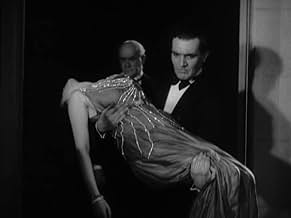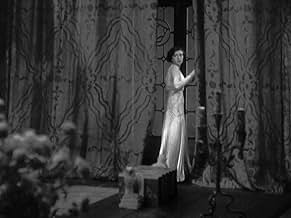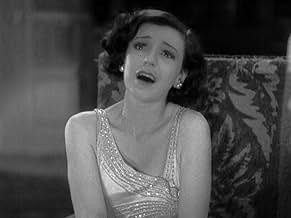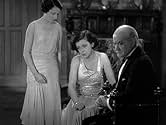IMDb-BEWERTUNG
5,7/10
3829
IHRE BEWERTUNG
Eine traditionell lebende Familie und eine moderne Familie kämpfen in einem kleinen englischen Dorf um Land und zerstören sich fast gegenseitig.Eine traditionell lebende Familie und eine moderne Familie kämpfen in einem kleinen englischen Dorf um Land und zerstören sich fast gegenseitig.Eine traditionell lebende Familie und eine moderne Familie kämpfen in einem kleinen englischen Dorf um Land und zerstören sich fast gegenseitig.
- Regie
- Drehbuch
- Hauptbesetzung
Rodney Ackland
- Man at Auction
- (Nicht genannt)
Ivor Barnard
- Man at Auction
- (Nicht genannt)
Wally Patch
- Van Driver
- (Nicht genannt)
Empfohlene Bewertungen
Fine and interesting story from the play of the same name adapted by Alfred Hitchcock himself and his wife and usual writer Alma Reville . Dealing with two British families : the aristocratic Hillcrist family, and Hornblower family headed by proud and ambitious Mr. Hornblower : Edmund Gwenn , both of them feud over land rights . As the latter , the mercilessly pushy Mister Hornblower sends away and evicts poor farmers to build factories on their lands . After that , Mr. Hornblower outwits Hillcrist in an auction for an additional piece of area property , the wealthy Hillcrists find their big estate completely surrounded by the upstart Hornblower . Things go wrong when Mrs. Hillcrest settles a terrible secret about a dark past of the Hornblower family .
It isn't thrilling , neither suspenseful , non characteristic of working with Hitchcock , but a tumultuous and strong drama . Way too much talking in excruciating , long and drawn-out scenes . This is a brooding drama whose premise turns out to be the hard confrontation between a rich family , the Hillcrests , fighting against the speculator who attempts to make a chimneyed factory complex , Hornblower , then emerges a dark secret resulting in tragic consequences , as it is used as a blackmail againts the speculator and force him to stop doing business . Performances are uniformly good , though in an excessive theatrical style . Based on a successfyl play and still stunningly hypnotic to see today . In fact , being , nowadays ,more stimulating for its innovations in that area , and by experimenting with a peculiar narrative structure . This fine early effort by Hitch has several novelties , as the movie transcends the limitation of its dramatic plot by dealing with thought-provoking issues and focusing on the theatrical meditations of reality . Here Alfred gives a few signs to be an expertise at tightening tension that was already building up . Main known actor results to be Edmund Gwen , giving a nice acting as the nouveau riche, social climber Mr. Hornblower who buys a lot of property abutting their state. Along with other notorious but unknown actors such as : Jill Esmond , Helen Haye , Phyllis Konstam, John Longden, Frank Lawton , C. V. France , Herbert Ross , among others .
This early talkie motion picture was well realized by the famous Alfred Hitchcock and made in his previous British period . His first sound film for Great Britain was ¨Blackmail¨, being made as a silent movie , this one was really an early talkie . This film ¨Skin Game¨1931 belongs to Hitch's first British epoch when he directed silent films, such as ¨The lodger¨ (1926) , ¨The ring¨(1927) , ¨Easy virtue¨ (1927) , ¨The Manxman¨(29) ; being ¨Blackmail¨(29) made as a silent , this was reworked to become a talkie . Following sound movies and early talkies as ¨Murder¨(1930 , ¨June and the Paycock¨(30) , ¨Rich and strange¨(32) , ¨Number 17¨(32) , ¨The man who knew too much¨(34) , ¨The 39 steps¨ (35) , ¨The secret agent¨(36) , ¨Sabotage¨(36) , ¨The lady vanishes¨(38) , ¨Jamaica Inn¨ (39) until he is hired by David O'Selznick to shoot¨Rebecca¨(40) in the US and continuing with other popular movies and masterpieces with world successes .
It isn't thrilling , neither suspenseful , non characteristic of working with Hitchcock , but a tumultuous and strong drama . Way too much talking in excruciating , long and drawn-out scenes . This is a brooding drama whose premise turns out to be the hard confrontation between a rich family , the Hillcrests , fighting against the speculator who attempts to make a chimneyed factory complex , Hornblower , then emerges a dark secret resulting in tragic consequences , as it is used as a blackmail againts the speculator and force him to stop doing business . Performances are uniformly good , though in an excessive theatrical style . Based on a successfyl play and still stunningly hypnotic to see today . In fact , being , nowadays ,more stimulating for its innovations in that area , and by experimenting with a peculiar narrative structure . This fine early effort by Hitch has several novelties , as the movie transcends the limitation of its dramatic plot by dealing with thought-provoking issues and focusing on the theatrical meditations of reality . Here Alfred gives a few signs to be an expertise at tightening tension that was already building up . Main known actor results to be Edmund Gwen , giving a nice acting as the nouveau riche, social climber Mr. Hornblower who buys a lot of property abutting their state. Along with other notorious but unknown actors such as : Jill Esmond , Helen Haye , Phyllis Konstam, John Longden, Frank Lawton , C. V. France , Herbert Ross , among others .
This early talkie motion picture was well realized by the famous Alfred Hitchcock and made in his previous British period . His first sound film for Great Britain was ¨Blackmail¨, being made as a silent movie , this one was really an early talkie . This film ¨Skin Game¨1931 belongs to Hitch's first British epoch when he directed silent films, such as ¨The lodger¨ (1926) , ¨The ring¨(1927) , ¨Easy virtue¨ (1927) , ¨The Manxman¨(29) ; being ¨Blackmail¨(29) made as a silent , this was reworked to become a talkie . Following sound movies and early talkies as ¨Murder¨(1930 , ¨June and the Paycock¨(30) , ¨Rich and strange¨(32) , ¨Number 17¨(32) , ¨The man who knew too much¨(34) , ¨The 39 steps¨ (35) , ¨The secret agent¨(36) , ¨Sabotage¨(36) , ¨The lady vanishes¨(38) , ¨Jamaica Inn¨ (39) until he is hired by David O'Selznick to shoot¨Rebecca¨(40) in the US and continuing with other popular movies and masterpieces with world successes .
I recently saw Hitchcock's "Rich and Strange" and really enjoyed it, so I was game for another go at this early 1930's British cinema, in my attempt to become a "Hitchcock completist." Please keep in mind that I'm an American with a pretty-good ear for British dialog, but there are some speeches contained here that I couldn't understand in the least. But only a fairly small portion that is. The early sound equipment doesn't help either.
The title "The Skin Game" refers to a heated altercation that leaves no holds barred, and no prisoners taken. The plot line is essentially a "Hatfields and McCoys" family feud over land rights, with a lot of dirt being dug up on both families involved. Like pretty much all early sound films, there is a heavy reliance on dialog and the spoken phrase, which makes "The Skin Game" obviously derived from the stage.
At the beginning there's a long take with probably ten pages of dialog in it, using a medium shot of three characters, with the camera panning between them. At least once, someone was speaking dialog while not on camera, which I always find distracting -- a minor flaw I admit, but noticeable. Hitchcock's pacing feels relatively quick considering, and he keeps interest in these scenes with dramatic exits and entrances of characters, and revelations of plot details.
Really some of these takes were so long that actors coughed, dropped things and retrieved them, and other apparent flubs that were never re-shot. Seems like once the director was five minutes into a scene he couldn't afford the film stock to begin again, so there are a lot of miscues and such, which kind of adds to the immediacy. Especially considering that I'm certain that even the young Hitchcock was keenly aware of every missed cue and dropped line, and it had to drive him to distraction! I was certainly impressed by this early Hitchcock effort and I'm sure that audiences back then went away from this one with the feeling that they got their money's worth. It was apparent that an extremely talented film maker was at work here, trying to keep the audience involved every step of the way. And he did succeed actually.
For instance, there is a scene at an auction house that lasts for about ten minutes, and Hitchcock sets it up in such a way to keep the audience anxiously awaiting the outcome. He has the camera making very fast pans from one bidder to the next, slowing down only when the bidding does. The audience has some background information about the proceedings, but not enough to spoil the surprise at the end.
It's early sound cinema -- so most viewers today can't bear this kind of thing, but if you're familiar with and enjoy films of the early 20Th Century, it's extremely enjoyable and does have a payoff at the end! *** out of *****
The title "The Skin Game" refers to a heated altercation that leaves no holds barred, and no prisoners taken. The plot line is essentially a "Hatfields and McCoys" family feud over land rights, with a lot of dirt being dug up on both families involved. Like pretty much all early sound films, there is a heavy reliance on dialog and the spoken phrase, which makes "The Skin Game" obviously derived from the stage.
At the beginning there's a long take with probably ten pages of dialog in it, using a medium shot of three characters, with the camera panning between them. At least once, someone was speaking dialog while not on camera, which I always find distracting -- a minor flaw I admit, but noticeable. Hitchcock's pacing feels relatively quick considering, and he keeps interest in these scenes with dramatic exits and entrances of characters, and revelations of plot details.
Really some of these takes were so long that actors coughed, dropped things and retrieved them, and other apparent flubs that were never re-shot. Seems like once the director was five minutes into a scene he couldn't afford the film stock to begin again, so there are a lot of miscues and such, which kind of adds to the immediacy. Especially considering that I'm certain that even the young Hitchcock was keenly aware of every missed cue and dropped line, and it had to drive him to distraction! I was certainly impressed by this early Hitchcock effort and I'm sure that audiences back then went away from this one with the feeling that they got their money's worth. It was apparent that an extremely talented film maker was at work here, trying to keep the audience involved every step of the way. And he did succeed actually.
For instance, there is a scene at an auction house that lasts for about ten minutes, and Hitchcock sets it up in such a way to keep the audience anxiously awaiting the outcome. He has the camera making very fast pans from one bidder to the next, slowing down only when the bidding does. The audience has some background information about the proceedings, but not enough to spoil the surprise at the end.
It's early sound cinema -- so most viewers today can't bear this kind of thing, but if you're familiar with and enjoy films of the early 20Th Century, it's extremely enjoyable and does have a payoff at the end! *** out of *****
....this is good early Hitch! good screenplay,good directing and good acting!Phyllis Konstam is the stand-out .Her portrayal of Chloé can still grab today's audience .
Good scenes:
-the auction sale,twenty-eight years before "North by Norwest" ,is one of the most suspenseful moments of the Master's English era.And there's a brilliant unexpected twist when we think it's over!
-when Chloe takes refuge in her father-in-law's enemy's house,the things seem to have a life of their own:the door,the window,the curtains..
And in 1931,Hitchcock avoids over-simplification:who is good,in the end?who is evil?The local squire and his lady or the arrogant nouveau riche?Who did you have to save?the old couple or the ill-fated Chloé?
In the Truffaut/Hitchcock book,the master says "I did not choose that subject and there is nothing to say about it."
Good scenes:
-the auction sale,twenty-eight years before "North by Norwest" ,is one of the most suspenseful moments of the Master's English era.And there's a brilliant unexpected twist when we think it's over!
-when Chloe takes refuge in her father-in-law's enemy's house,the things seem to have a life of their own:the door,the window,the curtains..
And in 1931,Hitchcock avoids over-simplification:who is good,in the end?who is evil?The local squire and his lady or the arrogant nouveau riche?Who did you have to save?the old couple or the ill-fated Chloé?
In the Truffaut/Hitchcock book,the master says "I did not choose that subject and there is nothing to say about it."
The early 30s were a time of experimentation for Hitchcock, with theme as much as with technique. After discovering that the crime thriller was his forte with Blackmail and Murder!, his at the time zigzagging career lead him to attempt a talkie drama adapted from a fairly mediocre stage play concerning a feud between the families of an aristocrat and an entrepreneur.
In attempting a straight ahead drama without any major thriller elements, Hitchcock nevertheless employs all the techniques he had been perfecting in his earlier crime pictures dynamic editing, a focus on the psychology of guilt and fear, as well as some of the sound techniques of his previous talkies. Sometimes it works, other times it doesn't. He tries to inject some tension into an auction scene with whip pans and quick editing, which is a fairly good display of technique but we don't really care enough about the outcome of the bidding to get really drawn in at this point.
For some of the more talky scenes, Hitchcock tries to move beyond the story's theatrical roots by focusing on reactions and having dialogue take place off screen. This helps to give weight to the second half of the film. In particular, Hitch's dwelling on the face of Chloe, the innocent victim of the feud, makes the audience feel sympathy for her character, which in turn makes the climactic scenes work and prevents them from slipping into ridiculous melodrama (which the stage version may well have done). For some of the more subdued scenes, Hitchcock preserves an unbroken take but still takes the focus on and off different characters by smoothly dollying in and out. This same method would be used by Laurence Olivier when he began directing Shakespeare adaptations in the 1940s. However, too many of the dialogue scenes in The Skin Game are simply a lot of panning as the camera tries to keep up with extravagant theatrical performances.
This is a fairly good go at theatrical drama for Hitchcock, but it was made at a time when he was coming to realise not only his strength in the suspense thriller, but his weakness in (and utter distaste for) every other genre. He was probably beginning to look at this kind of project as a rather dull waste of time, and definitely at odds to his sensibility. As an example, this is one of the very few Hitchcock pictures to take advantage of natural beauty, and yet he makes this aspect a victim of his playful irony, by taking his most beautiful countryside shot, then pulling out to reveal it is merely a tiny picture on a sale poster, surrounded by Hornblower and his cronies laughing over the deal they have just made.
The Skin Game is rarely gripping, but at times it is powerful, and in any case it has a short enough running time to prevent it from getting boring. Hitchcock however was looking now to have more fun with crime and suspense, and this sense of the dramatic (not to mention a sense of genuine sympathy for the victim) would not return until his later Hollywood pictures, and even then only occasionally.
In attempting a straight ahead drama without any major thriller elements, Hitchcock nevertheless employs all the techniques he had been perfecting in his earlier crime pictures dynamic editing, a focus on the psychology of guilt and fear, as well as some of the sound techniques of his previous talkies. Sometimes it works, other times it doesn't. He tries to inject some tension into an auction scene with whip pans and quick editing, which is a fairly good display of technique but we don't really care enough about the outcome of the bidding to get really drawn in at this point.
For some of the more talky scenes, Hitchcock tries to move beyond the story's theatrical roots by focusing on reactions and having dialogue take place off screen. This helps to give weight to the second half of the film. In particular, Hitch's dwelling on the face of Chloe, the innocent victim of the feud, makes the audience feel sympathy for her character, which in turn makes the climactic scenes work and prevents them from slipping into ridiculous melodrama (which the stage version may well have done). For some of the more subdued scenes, Hitchcock preserves an unbroken take but still takes the focus on and off different characters by smoothly dollying in and out. This same method would be used by Laurence Olivier when he began directing Shakespeare adaptations in the 1940s. However, too many of the dialogue scenes in The Skin Game are simply a lot of panning as the camera tries to keep up with extravagant theatrical performances.
This is a fairly good go at theatrical drama for Hitchcock, but it was made at a time when he was coming to realise not only his strength in the suspense thriller, but his weakness in (and utter distaste for) every other genre. He was probably beginning to look at this kind of project as a rather dull waste of time, and definitely at odds to his sensibility. As an example, this is one of the very few Hitchcock pictures to take advantage of natural beauty, and yet he makes this aspect a victim of his playful irony, by taking his most beautiful countryside shot, then pulling out to reveal it is merely a tiny picture on a sale poster, surrounded by Hornblower and his cronies laughing over the deal they have just made.
The Skin Game is rarely gripping, but at times it is powerful, and in any case it has a short enough running time to prevent it from getting boring. Hitchcock however was looking now to have more fun with crime and suspense, and this sense of the dramatic (not to mention a sense of genuine sympathy for the victim) would not return until his later Hollywood pictures, and even then only occasionally.
Early Hitchcock drama that proves with every film, he was experimenting. Here, he uses zip pans moving from person to person during a frantic auction scene. This technique wouldn't become commonplace for another thirty years with the introduction of cinema verite. Other than that, this is a rather ordinary drama.
Wusstest du schon
- WissenswertesThe title comes from a slang phrase for "an unscrupulous business operation". Although this movie is British, the term is considered American and dates back to just after the American Civil War (1861-1865). It is not to be confused with the similar-sounding aphorism "to have skin in the game", which refers to someone who has a stake, financial or emotional, in a business deal, wager, or other situation.
- Zitate
[last lines]
Mr. Hillcrist: What is it that gets loose when you start a fight, and makes you what you think you're not? Begin as you may, it ends in this skin game! Skin game! When we began this fight, we'd clean hands. Are they clean now? What's gentility worth if it can't stand fire?
- VerbindungenFeatured in Paul Merton Looks at Alfred Hitchcock (2009)
- SoundtracksHabanera
(1875) (uncredited)
from "Carmen"
Music by Georges Bizet
Libretto by Henri Meilhac and Ludovic Halévy
Excerpt whistled by Jill Esmond
Top-Auswahl
Melde dich zum Bewerten an und greife auf die Watchlist für personalisierte Empfehlungen zu.
Details
- Erscheinungsdatum
- Herkunftsland
- Sprache
- Auch bekannt als
- The Skin Game
- Drehorte
- Elstree Studios, Borehamwood, Hertfordshire, England, Vereinigtes Königreich(Studio, destroyed during World War II and later rebuilt)
- Produktionsfirma
- Weitere beteiligte Unternehmen bei IMDbPro anzeigen
- Laufzeit1 Stunde 25 Minuten
- Farbe
Zu dieser Seite beitragen
Bearbeitung vorschlagen oder fehlenden Inhalt hinzufügen

































